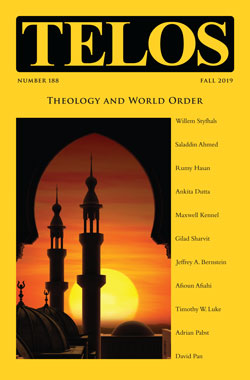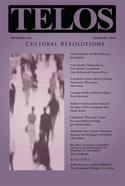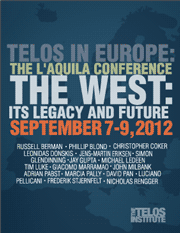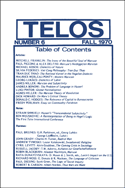By Maxwell Kennel · Friday, November 15, 2019 Maxwell Kennel’s “Periodization and Providence: Time and Eternity between Nietzsche’s Zarathustra and Augustine’s Confessions” appears in Telos 188 (Fall 2019). Read the full article at the Telos Online website, or purchase a print copy of the issue in our online store. Individual subscriptions to Telos are available in both print and online formats.
 In order to address the politics of temporal regulation and periodization, while considering ways in which competing religious and secular narratives construct contemporary subjectivity, this article compares the quasi-autobiographical narratives of Friedrich Nietzsche’s Thus Spoke Zarathustra and Saint Augustine’s Confessions. Looking beneath the surface differences between these two works, this study draws out surprising affinities and continuities between Zarathustra and the Confessions and compares each work’s vision of time and eternity. By examining Zarathustra’s parable of the gate and its punctuating moment (Augenblick) alongside Augustine’s notion of the distentio animi in book 11 of the Confessions, this article questions competing Christian and anti-Christian narratives and their use of teleology and providence in the periodization of time, and concludes by contesting these narratives from the standpoint of postsecular critique. In order to address the politics of temporal regulation and periodization, while considering ways in which competing religious and secular narratives construct contemporary subjectivity, this article compares the quasi-autobiographical narratives of Friedrich Nietzsche’s Thus Spoke Zarathustra and Saint Augustine’s Confessions. Looking beneath the surface differences between these two works, this study draws out surprising affinities and continuities between Zarathustra and the Confessions and compares each work’s vision of time and eternity. By examining Zarathustra’s parable of the gate and its punctuating moment (Augenblick) alongside Augustine’s notion of the distentio animi in book 11 of the Confessions, this article questions competing Christian and anti-Christian narratives and their use of teleology and providence in the periodization of time, and concludes by contesting these narratives from the standpoint of postsecular critique.
Continue reading →
By Greg Melleuish and Susanna Rizzo · Friday, September 13, 2013 Greg Melleuish and Susanna Rizzo’s “From Secular Temporality to Post-Secular Timelessness: Trekking the Past’s Future and Future’s Past” appears in Telos 163 (Summer 2013). Read the full version online at the Telos Online website, or purchase a print copy of the issue in our store.
 This essay is built on the assumption that History is as much about the future as it is about the past and that there is a “politics of history” that determines the relationship of the past to the present and the future. The secularization thesis created a model of history in which human beings passed from a condition in which they were religious, primitive, and querulous to one in which they were moving toward a world that would be not only secular but also peaceful. At the same time, the end of History can be understood in eschatological terms in which we are always at the end of days waiting for the purging that will allow the purpose of History to be fulfilled. The return of religion destroys this narrative and allows others to return, including History as irony and the possibility of the story as a denial of History. Post-secular History reflects both the crumbling of this once certain narrative and the legitimacy of the modern state that was built on that narrative. It is a crisis of authority, as can be seen in the proliferation of views and ideas that can be found on the world wide web, and the seeming erosion of the capacity of historians to control History and structure its narratives. This essay is built on the assumption that History is as much about the future as it is about the past and that there is a “politics of history” that determines the relationship of the past to the present and the future. The secularization thesis created a model of history in which human beings passed from a condition in which they were religious, primitive, and querulous to one in which they were moving toward a world that would be not only secular but also peaceful. At the same time, the end of History can be understood in eschatological terms in which we are always at the end of days waiting for the purging that will allow the purpose of History to be fulfilled. The return of religion destroys this narrative and allows others to return, including History as irony and the possibility of the story as a denial of History. Post-secular History reflects both the crumbling of this once certain narrative and the legitimacy of the modern state that was built on that narrative. It is a crisis of authority, as can be seen in the proliferation of views and ideas that can be found on the world wide web, and the seeming erosion of the capacity of historians to control History and structure its narratives.
Continue reading →
By Simon Glendinning · Monday, January 7, 2013 The following paper was presented at Telos in Europe: The L’Aquila Conference, held on September 7-9, 2012, in L’Aquila, Italy.
 How should we conceive the distinctive character, the “particular rarity,” of the wearing and growing of the contemporary world? How should we come to terms with our time? What words can we find that are fitting for its specificity when so many of the words we have found fitting hitherto, especially promising words about the course of human history and its political hopes, its hopes in the political (modernity, Enlightenment, civilization, socialism, etc.) sound more and more like the road signs of another age? How should we conceive the distinctive character, the “particular rarity,” of the wearing and growing of the contemporary world? How should we come to terms with our time? What words can we find that are fitting for its specificity when so many of the words we have found fitting hitherto, especially promising words about the course of human history and its political hopes, its hopes in the political (modernity, Enlightenment, civilization, socialism, etc.) sound more and more like the road signs of another age?
Are we not floundering today? Isn’t this, at least in part, what we need to understand, to make intelligible? So we might look out for writings, wherever they come from, that speak to and speak from this world, a world which today, it seems, more than ever, “wears as it grows.”
Continue reading →
By J. F. Dorahy · Monday, December 31, 2012 As an occasional feature on TELOSscope, we highlight a past Telos article whose critical insights continue to illuminate our thinking and challenge our assumptions. Today, J. F. Dorahy looks at Georg Lukács’s “The Dialectic of Labor: Beyond Causality and Teleology,” from Telos 6 (Fall 1970).
 Georg Lukács’s essay “The Dialectic of Labor” belongs to the last period of his life and was composed in the context of the so-called “renaissance of Marxism”: a movement, beginning in the mid-1950s, within several of the Eastern Bloc nations—most notably Hungary, Poland, and the former Yugoslavia—that sought to re-energize the humanistic dimensions of Marxism suppressed by the enforcement of orthodoxy. Lukács’s substantive contribution to the “renaissance of Marxism” took the form of two enormous projects: a Marxist ontology (Zur Ontologie des gesellschaftichen Seins) and a systematic aesthetics (Die Eigenart des Ästhetischen). Although Lukács’s relationship to “dialectical and historical materialism” remains complex, “The Dialectic of Labor” stands as a reflection of this humanistic tendency inasmuch as it, by way of an ontological elucidation of the “philosophy of praxis,” emphasizes the functional role of subjectivity as a constitutive moment in the social-historical process. Georg Lukács’s essay “The Dialectic of Labor” belongs to the last period of his life and was composed in the context of the so-called “renaissance of Marxism”: a movement, beginning in the mid-1950s, within several of the Eastern Bloc nations—most notably Hungary, Poland, and the former Yugoslavia—that sought to re-energize the humanistic dimensions of Marxism suppressed by the enforcement of orthodoxy. Lukács’s substantive contribution to the “renaissance of Marxism” took the form of two enormous projects: a Marxist ontology (Zur Ontologie des gesellschaftichen Seins) and a systematic aesthetics (Die Eigenart des Ästhetischen). Although Lukács’s relationship to “dialectical and historical materialism” remains complex, “The Dialectic of Labor” stands as a reflection of this humanistic tendency inasmuch as it, by way of an ontological elucidation of the “philosophy of praxis,” emphasizes the functional role of subjectivity as a constitutive moment in the social-historical process.
Continue reading →
|
|
 In order to address the politics of temporal regulation and periodization, while considering ways in which competing religious and secular narratives construct contemporary subjectivity, this article compares the quasi-autobiographical narratives of Friedrich Nietzsche’s Thus Spoke Zarathustra and Saint Augustine’s Confessions. Looking beneath the surface differences between these two works, this study draws out surprising affinities and continuities between Zarathustra and the Confessions and compares each work’s vision of time and eternity. By examining Zarathustra’s parable of the gate and its punctuating moment (Augenblick) alongside Augustine’s notion of the distentio animi in book 11 of the Confessions, this article questions competing Christian and anti-Christian narratives and their use of teleology and providence in the periodization of time, and concludes by contesting these narratives from the standpoint of postsecular critique.
In order to address the politics of temporal regulation and periodization, while considering ways in which competing religious and secular narratives construct contemporary subjectivity, this article compares the quasi-autobiographical narratives of Friedrich Nietzsche’s Thus Spoke Zarathustra and Saint Augustine’s Confessions. Looking beneath the surface differences between these two works, this study draws out surprising affinities and continuities between Zarathustra and the Confessions and compares each work’s vision of time and eternity. By examining Zarathustra’s parable of the gate and its punctuating moment (Augenblick) alongside Augustine’s notion of the distentio animi in book 11 of the Confessions, this article questions competing Christian and anti-Christian narratives and their use of teleology and providence in the periodization of time, and concludes by contesting these narratives from the standpoint of postsecular critique.  This essay is built on the assumption that History is as much about the future as it is about the past and that there is a “politics of history” that determines the relationship of the past to the present and the future. The secularization thesis created a model of history in which human beings passed from a condition in which they were religious, primitive, and querulous to one in which they were moving toward a world that would be not only secular but also peaceful. At the same time, the end of History can be understood in eschatological terms in which we are always at the end of days waiting for the purging that will allow the purpose of History to be fulfilled. The return of religion destroys this narrative and allows others to return, including History as irony and the possibility of the story as a denial of History. Post-secular History reflects both the crumbling of this once certain narrative and the legitimacy of the modern state that was built on that narrative. It is a crisis of authority, as can be seen in the proliferation of views and ideas that can be found on the world wide web, and the seeming erosion of the capacity of historians to control History and structure its narratives.
This essay is built on the assumption that History is as much about the future as it is about the past and that there is a “politics of history” that determines the relationship of the past to the present and the future. The secularization thesis created a model of history in which human beings passed from a condition in which they were religious, primitive, and querulous to one in which they were moving toward a world that would be not only secular but also peaceful. At the same time, the end of History can be understood in eschatological terms in which we are always at the end of days waiting for the purging that will allow the purpose of History to be fulfilled. The return of religion destroys this narrative and allows others to return, including History as irony and the possibility of the story as a denial of History. Post-secular History reflects both the crumbling of this once certain narrative and the legitimacy of the modern state that was built on that narrative. It is a crisis of authority, as can be seen in the proliferation of views and ideas that can be found on the world wide web, and the seeming erosion of the capacity of historians to control History and structure its narratives.  How should we conceive the distinctive character, the “particular rarity,” of the wearing and growing of the contemporary world? How should we come to terms with our time? What words can we find that are fitting for its specificity when so many of the words we have found fitting hitherto, especially promising words about the course of human history and its political hopes, its hopes in the political (modernity, Enlightenment, civilization, socialism, etc.) sound more and more like the road signs of another age?
How should we conceive the distinctive character, the “particular rarity,” of the wearing and growing of the contemporary world? How should we come to terms with our time? What words can we find that are fitting for its specificity when so many of the words we have found fitting hitherto, especially promising words about the course of human history and its political hopes, its hopes in the political (modernity, Enlightenment, civilization, socialism, etc.) sound more and more like the road signs of another age?  Georg Lukács’s essay “The Dialectic of Labor” belongs to the last period of his life and was composed in the context of the so-called “renaissance of Marxism”: a movement, beginning in the mid-1950s, within several of the Eastern Bloc nations—most notably Hungary, Poland, and the former Yugoslavia—that sought to re-energize the humanistic dimensions of Marxism suppressed by the enforcement of orthodoxy. Lukács’s substantive contribution to the “renaissance of Marxism” took the form of two enormous projects: a Marxist ontology (Zur Ontologie des gesellschaftichen Seins) and a systematic aesthetics (Die Eigenart des Ästhetischen). Although Lukács’s relationship to “dialectical and historical materialism” remains complex, “The Dialectic of Labor” stands as a reflection of this humanistic tendency inasmuch as it, by way of an ontological elucidation of the “philosophy of praxis,” emphasizes the functional role of subjectivity as a constitutive moment in the social-historical process.
Georg Lukács’s essay “The Dialectic of Labor” belongs to the last period of his life and was composed in the context of the so-called “renaissance of Marxism”: a movement, beginning in the mid-1950s, within several of the Eastern Bloc nations—most notably Hungary, Poland, and the former Yugoslavia—that sought to re-energize the humanistic dimensions of Marxism suppressed by the enforcement of orthodoxy. Lukács’s substantive contribution to the “renaissance of Marxism” took the form of two enormous projects: a Marxist ontology (Zur Ontologie des gesellschaftichen Seins) and a systematic aesthetics (Die Eigenart des Ästhetischen). Although Lukács’s relationship to “dialectical and historical materialism” remains complex, “The Dialectic of Labor” stands as a reflection of this humanistic tendency inasmuch as it, by way of an ontological elucidation of the “philosophy of praxis,” emphasizes the functional role of subjectivity as a constitutive moment in the social-historical process. 

